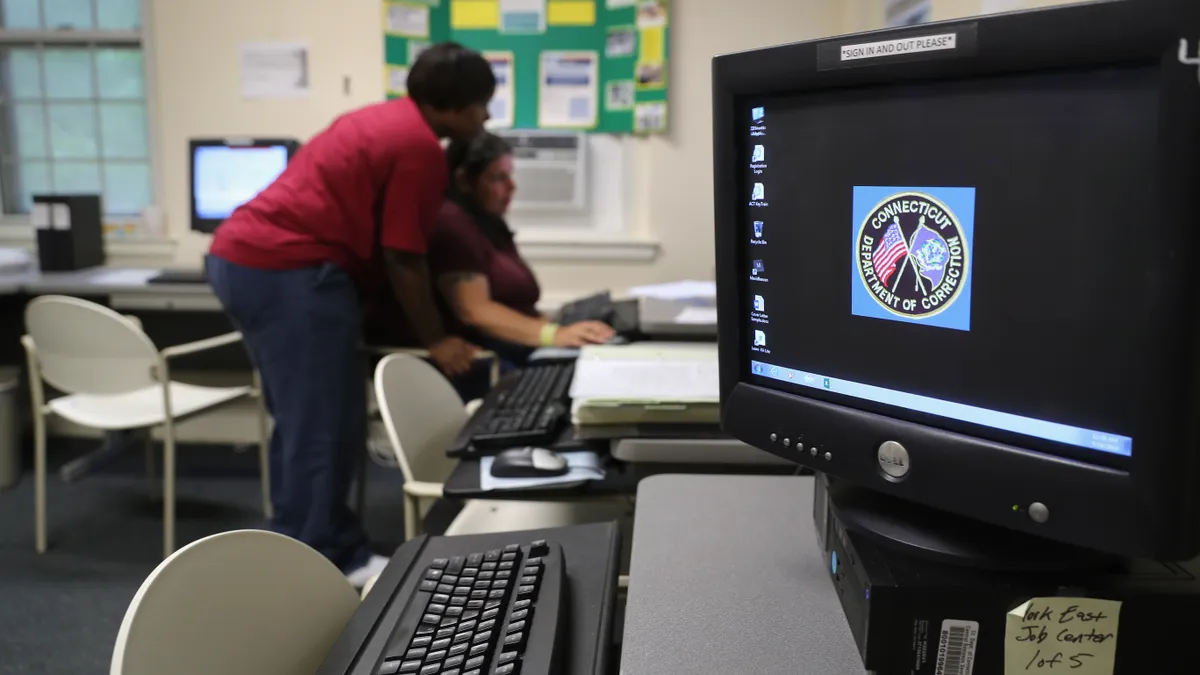Coaching isn’t new to HR and neither are online courses — but the emerging combination of the two may create headaches for learning leaders who have an unprepared mentor base.
Employers have leaned hard into online learning technology and "blended learning" over the old classroom standby. Employees expect online learning experiences to be "outstanding," Janet Harvey, member of the International Coaching Federation Thought Leadership Global Board and master certified coach, told HR Dive in an interview. But the skills expected of employees these days — especially those in high-touch or highly social work — are the "very sophisticated human-relating capabilities" that simple online learning courses may not be able to teach effectively alone, Harvey noted.
As employees demand more full-throated career development programs that can outline job pathways and progression goals, more employers may invest in mentorship, Philippa Williams, head of talent at Alexander Mann Solutions, told HR Dive in an interview. But in reality, that job often falls to front-line managers, especially once online courses have been otherwise provided.
Unfortunately, the experts said, employers and managers are not ready for this particular blended reality.
Managers either open or shut the door to learning
For many companies, bad managers can be to blame for poor learning outcomes and disengaged employees — but those bad managers are enabled by poor company investment, Harvey said.
Managers, before their promotions, are often considered rock stars thanks to their technical acumen on the job. These go-to individuals are then promoted to management to oversee processes, which requires a very different set of skills than the ones that won them success originally. "Now it’s no longer about your expertise," Harvey said. "We’re trying to scale up to infuse six people to behave the way you behave. Basically, go replace yourself, manager. But they don’t know how to do that."
Managerial training is a routinely underinvested space, Harvey said. As a result, managers feel incapable of teaching their successful processes to their direct reports, so they end up doing the tasks themselves and snuffing out the engagement of their reports.
"We spend all this money on high potentials," Harvey said. "I’m not saying that’s not important, but if we took 10% of the money that we spend at the top of the house and put that down at the front-line supervisors, we would not have succession planning issues."
Companies have to see managers as their teams’ coaches, Williams said — which may involve explaining to managers exactly what the employer expects. "We had to bust the myth that it is something you have to prepare a lot for and take employees off for two hours for," she said. Any quick interaction with team members can include coaching. "If you just ask really open questions and help them discover the answer for themselves," she added, managers can better connect with their teams and create a lasting learning experience at the same time.
More broadly, some learning leaders still struggle to find buy-in from leadership, Harvey said. Looking at the HR department, "it would shock you" how few are in L&D, she added.
The emerging collaborative workplace, however, has challenged typical thinking around training. "People only saw training as signing up for a course … and so if they attended that, they felt like they hadn’t had any development or training," Williams said. A more collaborative model involving managers stepping up to coach employees in the moment leads to more successes.
Steps forward
Managers play a key role in encouraging direct reports to seek out new skills. A majority of learners, according to a report from LinkedIn Learning, would take certain online courses if their manager suggested it, Tanya Staples, VP of Learning Content for LinkedIn Learning, told HR Dive in an email. "This means L&D should work on arming managers with a curated list of courses and learning paths that they can then pass along to their teams," Staples said. "The goal here is to make it as easy as possible for managers to recommend learning content."
But if managers simply point workers to good content without further coaching on how to use that new information, workers may feel too overwhelmed to get any real use out of the training, Harvey said.
"Will I be as successful when I try these new skills? Or will I be clumsy?" she said, speaking from the point of view of the learner. "In that case, I’ll just stick to my old way of working. I have a job to do."
Coaching addresses those biases toward the "old version of working," Harvey added. A good coach helps students figure out just what they learned from the training so it sticks. Performance review season "is the perfect time" for managers to suggest learning opportunities and good courses, Staples said.
Managers, too, should be careful about how they share feedback, particularly negative feedback. "It can be demoralizing on accident if a manager isn’t encouraging," Williams said. But managers can be frustrated by people not responding in the same way to courses as they might have, she added, which means managers should have extensive training on recognizing that people work and learn in different ways.
For employers trying to tackle big business problems, a combination of well-trained managers and solid training courses can improve critical thinking throughout the organization — and it "can’t be done through machines," Harvey said. "This is why coaching has a sweet spot here."






















